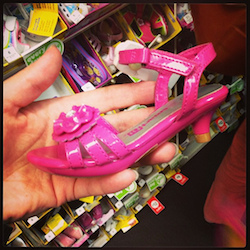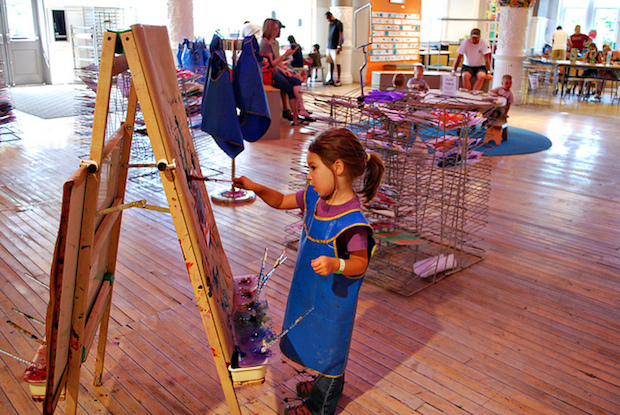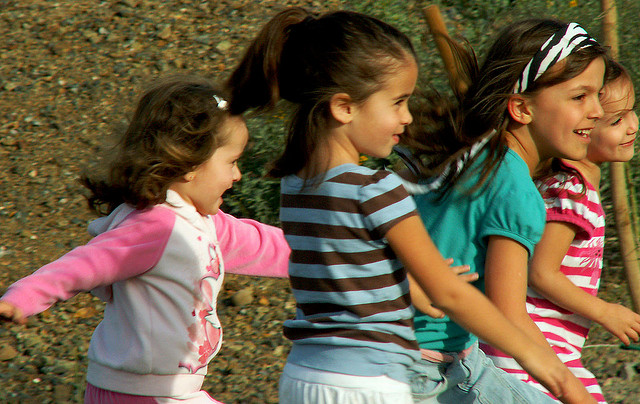Can you disordered-eating-proof your kids?
Hello parents!

Baby high heels — WTF?! Photo credit: Vanessa Bertozzi
Has your baby quit freaking out about her reflection in a mirror, thinking it’s another evil baby about to attack her and steal her mashed peas? Does she have a sense of “me-ness”, as evinced by the plaintive wail of NOOOOO MEEEEE WANT NOWWWW!!!? Does she have enough of an ego to hog her toys or express her unique personhood, perhaps by colouring all over your white couch?
Great!
Now your darling child is on the road to having her emergent selfhood crushed into a cube by the fuckedupitude that is our North American culture!
But fear not, Stumptuous is here.
Recently, I got something like the following letter from a concerned mother:
Dear Stumptuous lady,
I try to promote healthy eating and a healthy body image at home. We don’t allow the F-word — “fat” — in my household, nor do we discuss weight gain or loss, especially in relation to our kids, ever.
My 5-year-old daughter asked me why the kids at school call one of the teachers “fat”. And another one of my friends discovered that her young daughter was making herself sick after meals because a student at her school told her daughter she was fat and that was the solution.
I couldn’t contain myself as the anger was overwhelming when I heard this heartbreaking story.
I’m not prepared to tackle these issues so soon.
I explained to my daughter that her teacher is beautiful, and people are different shapes and sizes. I added that some children don’t understand that yet and have some learning to do as they grow up.
The bigger question is: How do we teach our young girls how to be — how to love their bodies and how to overcome the bullshit that pollutes kids’ minds and behaviours?
I struggled with my own issues as a child, being bullied and called fat, dieting at an early age. Now I’m in my 40s, I still don’t have any answers.
I was deeply touched by this letter.
I could feel the distress and pain this mother — as well as so many other parents — must feel as they watch their adorable little flowers wilt against the onslaught of cultural pressures.
What to do? What to say?
Why is a parent’s fierce mother-bear love not enough?
Why is shit so fucked up out there? Can I just wrap my child in bubble wrap and hold her in a hug forever?
Well, I’m not a parent. But I do coach the adult women who now endure the aftermath of difficult childhoods, and struggle to raise their own vulnerable children in a healthy and sane way.
Here was my response.
Dear kind and caring mom,
Thank you for your very insightful and thought-provoking email.
I don’t have easy answers.
But I can give you some clues for how to start working these difficult questions through.
Disordered eating and poor body image is correlated strongly with:
1. Alexithymia — inability to sense in to and express what one is feeling.
2. Loss of control and major life transitions without support — e.g. changing schools, divorce, moving, etc.
3. Interpersonal difficulties — trouble with social skills, trouble with relationships.
4. Narrow life focus — lack of involvement in a broad, diverse, meaningful selection of activities.
So, to begin addressing these factors, you can think about how to do the opposite.
For instance:
1. Teach children how to (a) sense in to what they are feeling, and then (b) express that.
For instance, by keeping a journal, drawing pictures (we find this very useful for clients who struggle to find words), dramatizing their feelings through play, etc.

Photo credit: twentysixcats, Flickr
Talk about feelings.
Help them learn what feelings feel like, and to be able to develop a rich emotional and psychological vocabulary for identifying and expressing those sensations and internal states.
“Where do you feel sad in your body?”
“What is sad like for you?”
“Does sad have a colour? A shape? What’s a sad song?”
“Does sad look like a person?”
“Are there different kinds of sad for you, like a cry-sad and a quiet-sad?”
“When were you sad last? What happened to make you sad? How did you deal with it?”
At the heart, disordered eating and other body issues are a way that our bodies speak their truth.
Emotions will come out, one way or another.
Whether you eat (or don’t eat), push and punish your body (or withdraw and hide it), or ruminate obsessively on what you should or shouldn’t be doing with your diet and exercise — that’s a way for emotions to express themselves.
Emotions will find a way out, like water.
If you learn to recognize and express emotions, they won’t have to find their way out through the cracks in your shell.
2. Help children feel more in control of their lives, perhaps by showing how they can make small yet important decisions in their own experiences.
For example, parents of even very young children can support childrens’ sense of autonomy by including them in decisions — even if it’s as simple and silly as:
“You can wear the red shirt or the blue shirt today — which one would you like?”
Or: “You can choose what fruit we eat for dessert — which one would you like?”
Or: “Now that you’re moving to the big-girl bed, why don’t we go pick out a bedspread together?”
With older children, decisions are a great opportunity to talk about the why and how of choice. This also helps you explore their evolving values, goals, and life priorities.
“That’s interesting. What is it you like about that one? Why did you choose that one? What appealed to you about it?”
“If you have to choose between two options that both seem good, how do you go about deciding? What things do you think about? Why?”
“Right now, what’s more important for you — doing Extracurricular Activity X or doing Extracurricular Activity Y? Why?”
Remember: Disordered eating and body image issues are fundamentally ways to control a small part of what feels like an inherently uncontrollable life.
Thus, the opposite of that is to build a life where children feel like they have a say in things that affect them.
This doesn’t mean they get to run everything or that you should be a pushover, but there are quite a lot of small daily decisions where children can easily create a feeling of autonomy.
And support any transitions that children undergo, for example with counselling, open discussions, extra quality time, emotional availability of support figures like parents and trusted adults, etc.
3. Train social skills. Talk openly about relationships. Have challenging conversations and model how to ask for what you want, identify and state your needs, etc.
People who struggle with disordered eating, exercise compulsions, and other body issues generally also struggle to relate to themselves and others.
They don’t know what they want and need, they don’t know how to ask for it, they’re often lonely as hell (even with people around them), they have a hard time reaching out or asking for help, and they may have a weak social network.
So again, figure out how to do the opposite of that.
If you want your kids to learn interpersonal skills, you’ve gotta teach them. Explicitly. Over and over and over.
You’ve gotta talk about icky stuff like feelings and why the universe isn’t perfect.
You’ve gotta model being a grownup and asking assertively and maturely for what you need and want. You’ve gotta model having needs in the first place, instead of being “martyr mom” or “strong and silent suffering dad”.
You’ve gotta model respect for others. (When I saw members of my own family being discourteous to one another growing up, I vowed I would always say “Please” and “Thank you” and “I really appreciated it when you…” to my husband. Try it — you won’t be sorry.)
You’ve gotta “go there”, perhaps to places you don’t want to go because it makes you feel awkward and nobody ever taught you how to talk about it either. Forgive yourself for never learning this, and then vow to correct that mistake, starting now.
And speaking of forgiveness, you’ve gotta have a good relationship with you. Be compassionate and loving with yourself. Show your children how to do the same.
You’ve gotta work on your own relationship skills. Yes, skills — relationships are skills like any other skills. Skills need education and practice. Lots of practice. And the ability to suck it up, get over yourself, take feedback, and be lovingly honest and self-aware.
Three handy books to get you started:
Crucial Conversations | Difficult Conversations | Self-Compassion
4. Expose children to lots of cool, potentially meaningful activities.
This can include:
- Volunteering and caring for others (e.g. animals, people) along with social causes like environmental stuff, working on a farm or community garden, etc.
- Hobbies
- Creating and producing, making things — creativity in particular is a powerful healing and energizing life force
- Community/relatively noncompetitive sports (something with non-messed-up body images, ideally)
- Outdoors/nature stuff (which can, again, include working with animals, who are often gifted at connecting with people who can’t [yet] connect with themselves)
- Travel, especially travel that requires them to get out of their comfort zone (e.g. try a new food, a new language, a new geography, a new culture, etc.); this could be as close as checking out a new neighbourhood in your own city
- Anything where they feel truly, deeply engaged; gain skills; connect with people, ideas or animals; and feel like they are making an important difference in the world.
Basically, broaden their world and their perspectives.
All right! That gives you some stuff to work on and try! 🙂
Obviously you can start really small.
For example, talk about feelings and what they’re like, how to know and express when you’re “feeling bad/sad/mad” etc.
You can also model emotional expression and share how YOU feel about the fat issue, in language your daughter can understand, e.g. “Mommy feels sad when…”. Or encourage your daughter to draw her thoughts, feelings, etc.
Remember, it’s not just about the food.
Healthy food, healthy eating, healthy movement and activity — yes, these are essential for a healthy life.
But it doesn’t stop there.
At a basic level, problems with disordered eating, compulsive exercise, or other body issues represent a lack of social, relational, interpersonal, and emotional health.
We all crave connectedness. We all have a vast inner universe of emotions that long to be recognized and expressed.
So don’t get too distracted by the food, eating, or exercise.
Look at the bigger picture, try a few “opposite days”, and enjoy some very interesting dinner table conversations!

Photo credit: Cobalt123, Flickr.
